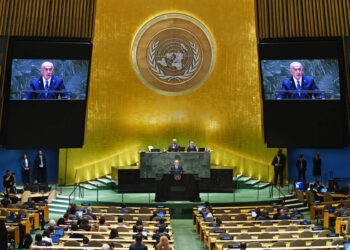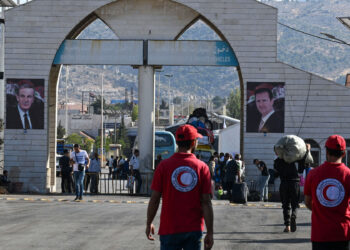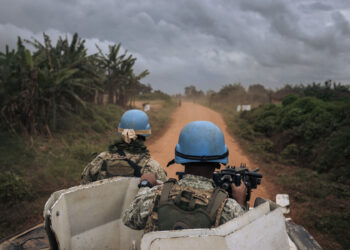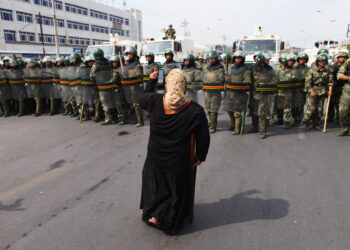Seifeddine Ferjani is a Tunisian political analyst living in the United Kingdom. He writes about North African regional affairs, particularly Tunisia and Libya.
عربي
When President Kais Saied dissolved Tunisia's parliament on March 30, nothing about it was unexpected. He had already replaced the Supreme Judicial Council, shut down the anti-corruption commission and used a range of extraordinary measures to make blanket arrests and intimidate his critics since his coup last summer. He responded to the first direct challenge to his power grab—as Tunisians lawmakers met for the first time since he suspended parliament and voted to block the emergency powers he had granted himself last year—by getting rid of the legislature entirely.
Those MPs who defied Saied's dictatorship and met virtually may now face charges of "forming a criminal association" to "endanger the state and cause chaos," which could come with a jail sentence of 20 years and even the death penalty, under Tunisia's dangerously broad anti-terrorism law. It is another sign that, for all the resistance of some Tunisian judges, the judiciary is now essentially Saied's personal fiefdom. The security services that are close to him also do his bidding.
But increasingly, other forces that were supposed to safeguard Tunisia's democracy are siding with Saied, too. The military that swore to protect the constitution instead helped him sideline it, when its tanks shuttered parliament and when it accepted Saied's accumulation of near-absolute power, culminating in parliament's dissolution. The army has insisted to foreign observers that it is neutral, while military courts arrest and prosecute Saied's opponents. Most of all, the military continues to recognize Saied's authority, as he defies the constitution to rule by decree and dismantle the democracy it enshrines. The dictator who claimed he was dissolving parliament "to protect the government, the institution and the Tunisian people" keeps fragmenting the country that the military is tasked to keep whole.
The judiciary is now essentially Saied's personal fiefdom. The security services also do his bidding. But increasingly, other forces that were supposed to safeguard Tunisia's democracy are siding with Saied, too.
- Seifeddine Ferjani
The military is not alone in this growing collusion. Many Western democracies have shown a remarkable amount of passivity about Saied's systematic tear down of Tunisia's democracy. Some countries have opted to humor Saied, providing him time to consolidate his power, all while society and the state crack under the weight of a perfect storm of economic, political and social crisis. The world can't say it was distracted; countries like France have been indulging Saied with their support well before Russia's invasion of Ukraine captured global attention. The United States, for its part, has studiously avoided calling his coup a "coup," since it would legally trigger the suspension of U.S. financial aid to Tunisia. As we sit watching the horrors of Bucha and Mariupol, one can't help but think what would have happened if Western countries had responded more forcefully to Russia's authoritarian drift earlier, and its impacts from Syria to Libya. Unfortunately, we will have to live with the unfolding consequences of such normalization with dictatorship.
For Tunisia, that means living with the inevitable horrors that come with every authoritarian regime and dictator, now made worse by the war in Ukraine. It is clear that chaos and instability are looming. With bread lines growing, rationing on the rise and the cost of fuel spiking, Tunisians are already dealing with the shock waves of Vladimir Putin's war. Tunisia is especially vulnerable in a region hugely reliant on food imports from Russia and Ukraine; 56 percent of all its wheat imports over the past five years came from those two countries. But things will get even worse because of the lack of any accountability or check on Saied's power, or that of his inner circle.
Corruption will likely rise, further gutting the economy. Police and security officials, whose pay covers less and less for their families, will find it increasingly difficult to resist bribes, as Saied's new promotions in the security services are more willing look away at such infractions in exchange for loyalty to them and Saied's new order. Kickbacks from foreign contracts and profiteering from wheat and other imports could become rampant because of shortages and because of Saied's campaign against anyone, including journalists and judges, who would expose such crimes.
As an insurgent leader who doesn't trust the state, Saied has sanctioned a culture of impunity. Thugs do his bidding, as the abusive treatment of MPs and elected officials like former Justice Minister and Ennahda deputy Noureddine Bhiri becomes the norm. Journalists like Chahrazed Akacha are being harassed as press freedom shrinks.
If Western countries won't take a stand against the dismantling of Tunisia's democracy, they must ready themselves for the inevitable consequences.
- Seifeddine Ferjani
If Western countries won't take a stand against the dismantling of Tunisia's democracy, they must ready themselves for the inevitable consequences. Saied is increasing his brutality, preferring the acquisition of more power over stability, splitting Tunisia into "traitors" and his followers. There have yet to be any costs imposed on him and his inner circle of ministers and family members, in the form of sanctions or international isolation, let alone just naming and shaming them while the rule of law in Tunisia is reduced to whether or not you're in the president's good favor.
Tunisia desperately needs aid as the war in Ukraine takes its toll with soaring prices for food and energy, which have exacerbated long-running economic problems. But can Saied and his coterie be trusted to solve this crisis or administer any such aid, given the culture of impunity and complete lack of accountability? With Saied at the helm, a dark future awaits Tunisia. To accept everything he is doing—the illegal power grab and effective suspension of the constitution; the dissolution of parliament; the takeover of the judiciary; the revival of a police state; the demonization of anyone who disagrees—will only legitimize the hell that comes with all this unchecked power.
History has shown that, eventually, either Saied will turn on the current batch of insiders he has elevated around him, or they will turn on him, with the authoritarian logic of sacrificing anyone in the name of holding onto power as things crumble around the regime. But that should bring no one comfort, and it won't satisfy a populace in despair; in either case, Tunisia loses its democracy and dictatorship survives. Western democracies cannot say they have no part in what Tunisia has become if they keep indulging Saied and ignoring his abuses.







